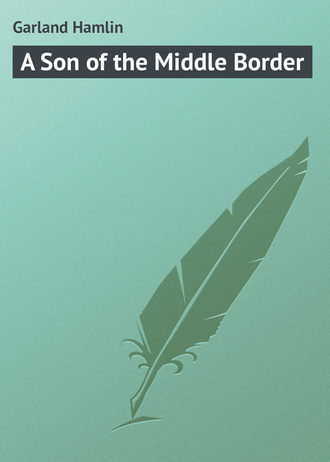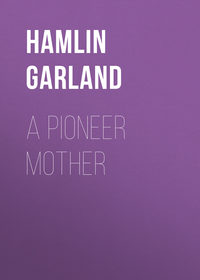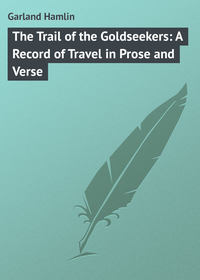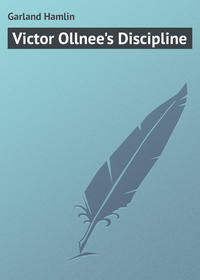 полная версия
полная версияA Son of the Middle Border
Once Burton left a soup-bone to simmer on the stove while we went away to morning recitations, and when we reached home, smoke was leaking from every keyhole. The room was solid with the remains of our bone. It took six months to get the horrid smell of charred beef out of our wardrobe. The girls all sniffed and wondered as we came near.
On Fridays we went home and during the winter months very generally attended the Lyceum which met in the Burr Oak school-house. We often debated, and on one occasion I attained to the honor of being called upon to preside over the session. Another memorable evening is that in which I read with what seemed to me distinguished success Joaquin Miller's magnificent new poem, Kit Carson's Ride and in the splendid roar and trample of its lines discovered a new and powerful American poet. His spirit appealed to me. He was at once American and western. I read every line of his verse which the newspapers or magazines brought to me, and was profoundly influenced by its epic quality.
And so, term by term, in growing joy and strength, in expanding knowledge of life, we hurried toward the end of our four years' course at this modest little school, finding in it all the essential elements of an education, for we caught at every chance quotation from the scientists, every fleeting literary allusion in the magazines, attaining, at last, a dim knowledge of what was going on in the great outside world of letters and discovery. Of course there were elections and tariff reforms and other comparatively unimportant matters taking place in the state but they made only the most transient impression on our minds.
During the last winter of our stay at the Seminary, my associate in housekeeping was one Adelbert Jones, the son of a well-to-do farmer who lived directly east of town. "Del," as we called him, always alluded to himself as "Ferguson." He was tall, with a very large blond face inclined to freckle and his first care of a morning was to scrutinize himself most anxiously to see whether the troublesome brown flecks were increasing or diminishing in number. Often upon reaching the open air he would sniff the east wind and say lugubriously, "This is the kind of day that brings out the freckles on your Uncle Ferg."
He was one of the best dressed men in the school, and especially finicky about his collars and ties, – was, indeed, one of the earliest to purchase linen. He also parted his yellow hair in the middle (which was a very noticeable thing in those days) and was always talking of taking a girl to a social or to prayer meeting. But, like Burton, he never did. So far as I knew he never "went double," and most of the girls looked upon him as more or less of a rustic, notwithstanding his fine figure and careful dress.
As for me I did once hire a horse and carriage of a friend and took Alice for a drive! More than thirty-five years have passed since that adventure and yet I can see every turn in that road! I can hear the crackle of my starched shirt and the creak of my suspender buckles as I write.
Alice, being quite as bashful as myself, kept our conversation to the high plane of Hawthorne and Poe and Schiller with an occasional tired droop to the weather, hence I infer that she was as much relieved as I when we reached her boarding house some two hours later. It was my first and only attempt at this, the most common of all ways of entertaining one's best girl.
The youth who furnished the carriage betrayed me, and the outcry of my friends so intimidated me that I dared not look Alice in the face. My only comfort was that no one but ourselves could possibly know what an erratic conversationalist I had been. However, she did not seem to lay it up against me. I think she was as much astonished as I and I am persuaded that she valued the compliment of my extravagant gallantry.
It is only fair to say that I had risen by this time to the dignity of "boughten shirts," linen collars and "Congress gaiters," and my suit purchased for graduating purposes was of black diagonal with a long tail, a garment which fitted me reasonably well. It was hot, of course, and nearly parboiled me of a summer evening, but I bore my suffering like the hero that I was, in order that I might make a presentable figure in the eyes of my classmates. I longed for a white vest but did not attain to that splendor.
Life remained very simple and very democratic in our little town. Although the county seat, it was slow in taking on city ways. I don't believe a real bath-tub distinguished the place (I never heard of one) but its sidewalks kept our feet out of the mud (even in March or April), and this was a marvellous fact to us. One or two fine lawns and flower gardens had come in, and year by year the maples had grown until they now made a pleasant shade in June, and in October glorified the plank walks. To us it was beautiful.
As county town, Osage published two papers and was, in addition, the home of two Judges, a state Senator and a Congressman. A new opera house was built in '79 and an occasional "actor troupe" presented military plays like Our Boys or farces like Solon Shingle. The brass band and the baseball team were the best in the district, and were loyally upheld by us all.
With all these attractions do you wonder that whenever Ed and Bill and Joe had a day of leisure they got out their buggies, washed them till they glistened like new, and called for their best girls on the way to town?
Circuses, Fourth of Julys, County Fairs, all took place in Osage, and to own a "covered rig" and to take your sweetheart to the show were the highest forms of affluence and joy – unless you were actually able to live in town, as Burton and I now did for five days in each week, in which case you saw everything that was free and denied yourself everything but the circus. Nobody went so far in economy as that.
As a conscientious historian I have gone carefully into the records of this last year, in the hope of finding something that would indicate a feeling on the part of the citizens that Dick Garland's boy was in some ways a remarkable youth, but (I regret to say) I cannot lay hands on a single item. It appears that I was just one of a hundred healthy, hearty, noisy students – but no, wait! There is one incident which has slight significance. One day during my final term of school, as I stood in the postoffice waiting for the mail to be distributed, I picked up from the counter a book called The Undiscovered Country.
"What is this about?" I asked.
The clerk looked up at me with an expression of disgust. "I bought it for a book of travel," said he, "but it is only a novel. Want it? I'll sell it cheap."
Having no money to waste in that way, I declined, but as I had the volume in my hands, with a few minutes to spare, I began to read. It did not take me long to discover in this author a grace and precision of style which aroused both my admiration and my resentment. My resentment was vague, I could not have given a reason for it, but as a matter of fact, the English of this new author made some of my literary heroes seem either crude or stilted. I was just young enough and conservative enough to be irritated and repelled by the modernity of William Dean Howells.
I put the book down and turned away, apparently uninfluenced by it. Indeed, I remained, if anything, more loyal to the grand manner of Hawthorne, but my love of realism was growing. I recall a rebuke from my teacher in rhetoric, condemning, in my essay on Mark Twain, an over praise of Roughing It. It is evident, therefore that I was even then a lover of the modern when taken off my guard.
Meanwhile I had definitely decided not to be a lawyer, and it happened in this way. One Sunday morning as I was walking toward school, I met a young man named Lohr, a law student several years older than myself, who turned and walked with me for a few blocks.
"Well, Garland," said he, "what are you going to do after you graduate this June?"
"I don't know," I frankly replied. "I have a chance to go into a law office."
"Don't do it," protested he with sudden and inexplicable bitterness. "Whatever you do, don't become a lawyer's hack."
His tone and the words, "lawyer's hack" had a powerful effect upon my mind. The warning entered my ears and stayed there. I decided against the law, as I had already decided against the farm.
Yes, these were the sweetest days of my life for I was carefree and glowing with the happiness which streams from perfect health and unquestioning faith. If any shadow drifted across this sunny year it fell from a haunting sense of the impermanency of my leisure. Neither Burton nor I had an ache or a pain. We had no fear and cherished no sorrow, and we were both comparatively free from the lover's almost intolerable longing. Our loves were hardly more than admirations.
As I project myself back into those days I re-experience the keen joy I took in the downpour of vivid sunlight, in the colorful clouds of evening, and in the song of the west wind harping amid the maple leaves. The earth was new, the moonlight magical, the dawns miraculous. I shiver with the boy's solemn awe in the presence of beauty. The little recitation rooms, dusty with floating chalk, are wide halls of romance and the voices of my girl classmates (even though their words are algebraic formulas), ring sweet as bells across the years.
During the years '79 and '80, while Burton and I had been living our carefree jocund life at the Seminary, a series of crop failures had profoundly affected the county, producing a feeling of unrest and bitterness in the farmers which was to have a far-reaching effect on my fortunes as well as upon those of my fellows. For two years the crop had been almost wholly destroyed by chinch bugs.
The harvest of '80 had been a season of disgust and disappointment to us for not only had the pestiferous mites devoured the grain, they had filled our stables, granaries, and even our kitchens with their ill-smelling crawling bodies – and now they were coming again in added billions. By the middle of June they swarmed at the roots of the wheat – innumerable as the sands of the sea. They sapped the growing stalks till the leaves turned yellow. It was as if the field had been scorched, even the edges of the corn showed signs of blight. It was evident that the crop was lost unless some great change took place in the weather, and many men began to offer their land for sale.
Naturally the business of grain-buying had suffered with the decline of grain-growing, and my father, profoundly discouraged by the outlook, sold his share in the elevator and turned his face toward the free lands of the farther west. He became again the pioneer.
DAKOTA was the magic word. The "Jim River Valley" was now the "land of delight," where "herds of deer and buffalo" still "furnished the cheer." Once more the spirit of the explorer flamed up in the soldier's heart. Once more the sunset allured. Once more my mother sang the marching song of the McClintocks, and sometime, in May I think it was, father again set out – this time by train, to explore the Land of The Dakotas which had but recently been wrested from the control of Sitting Bull.
O'er the hills in legions, boys,Fair freedom's starPoints to the sunset regions, boys,Ha, ha, ha-ha!He was gone only two weeks, but on his return announced with triumphant smile that he had taken up a homestead in Ordway, Brown County, Dakota. His face was again alight with the hope of the borderman, and he had much to say of the region he had explored.
As graduation day came on, Burton and I became very serious. The question of our future pressed upon us. What were we to do when our schooling ended? Neither of us had any hope of going to college, and neither of us had any intention of going to Dakota, although I had taken "Going West" as the theme of my oration. We were also greatly worried about these essays. Burton fell off in appetite and grew silent and abstracted. Each of us gave much time to declaiming our speeches, and the question of dress troubled us. Should we wear white ties and white vests, or white ties and black vests?
The evening fell on a dark and rainy night, but the Garlands came down in their best attire and so did the Babcocks, the Gilchrists and many other of our neighbors. Burton was hoping that his people would not come, he especially dreaded the humorous gaze of his brother Charles who took a much less serious view of Burton's powers as an orator than Burton considered just. Other interested parents and friends filled the New Opera House to the doors, producing in us a sense of awe for this was the first time the "Exercises" had taken place outside the chapel.
Never again shall I feel the same exultation, the same pleasure mingled with bitter sadness, the same perception of the irrevocable passing of beautiful things, and the equally inexorable coming on of care and trouble, as filled my heart that night. Whether any of the other members of my class vibrated with similar emotion or not I cannot say, but I do recall that some of the girls annoyed me by their excessive attentions to unimportant ribbons, flounces, and laces. "How do I look?" seemed their principal concern. Only Alice expressed anything of the prophetic sadness which mingled with her exultation.
The name of my theme, (which was made public for the first time in the little programme) is worthy of a moment's emphasis. Going West had been suggested, of course by the emigration fever, then at its height, and upon it I had lavished a great deal of anxious care. As an oration it was all very excited and very florid, but it had some stirring ideas in it and coming in the midst of the profound political discourses of my fellows and the formal essays of the girls, it seemed much more singular and revolutionary, both in form and in substance, than it really was.
As I waited my turn, I experienced that sense of nausea, that numbness which always preceded my platform trials, but as my name was called I contrived to reach the proper place behind the footlights, and to bow to the audience. My opening paragraph perplexed my fellows, and naturally, for it was exceedingly florid, filled with phrases like "the lure of the sunset," "the westward urge of men," and was neither prose nor verse. Nevertheless I detected a slight current of sympathy coming up to me, and in the midst of the vast expanse of faces, I began to detect here and there a friendly smile. Mother and father were near but their faces were very serious.
After a few moments the blood began to circulate through my limbs and I was able to move about a little on the stage. My courage came back, but alas! – just in proportion as I attained confidence my emotional chant mounted too high! Since the writing was extremely ornate, my manner should have been studiedly cold and simple. This I knew perfectly well, but I could not check the perfervid rush of my song. I ranted deplorably, and though I closed amid fairly generous applause, no flowers were handed up to me. The only praise I received came from Charles Lohr, the man who had warned me against becoming a lawyer's hack. He, meeting me in the wings of the stage as I came off, remarked with ironic significance, "Well, that was an original piece of business!"
This delighted me exceedingly, for I had written with special deliberate intent to go outside the conventional grind of graduating orations. Feeling dimly, but sincerely, the epic march of the American pioneer I had tried to express it in an address which was in fact a sloppy poem. I should not like to have that manuscript printed precisely as it came from my pen, and a phonographic record of my voice would serve admirably as an instrument of blackmail. However, I thought at the time that I had done moderately well, and my mother's shy smile confirmed me in the belief.
Burton was white with stage-fright as he stepped from the wings but he got through very well, better than I, for he attempted no oratorical flights.
Now came the usual hurried and painful farewells of classmates. With fervid hand-clasp we separated, some of us never again to meet. Our beloved principal (who was even then shadowed by the illness which brought about his death) clung to us as if he hated to see us go, and some of us could not utter a word as we took his hand in parting. What I said to Alice and Maud and Ethel I do not know, but I do recall that I had an uncomfortable lump in my throat while saying it.
As a truthful historian, I must add that Burton and I, immediately after this highly emotional close of our school career, were both called upon to climb into the family carriage and drive away into the black night, back to the farm, – an experience which seemed to us at the time a sad anticlimax. When we entered our ugly attic rooms and tumbled wearily into our hard beds, we retained very little of our momentary sense of victory. Our carefree school life was ended. Our stern education in life had begun.
CHAPTER XX
The Land of the Dakotas
The movement of settlers toward Dakota had now become an exodus, a stampede. Hardly anything else was talked about as neighbors met one another on the road or at the Burr Oak school-house on Sundays. Every man who could sell out had gone west or was going. In vain did the county papers and Farmer's Institute lecturers advise cattle raising and plead for diversified tillage, predicting wealth for those who held on; farmer after farmer joined the march to Kansas, Nebraska, and Dakota. "We are wheat raisers," they said, "and we intend to keep in the wheat belt."
Our own family group was breaking up. My uncle David of pioneer spirit had already gone to the far Missouri Valley. Rachel had moved to Georgia, and Grandad McClintock was with his daughters, Samantha and Deborah, in western Minnesota. My mother, thus widely separated from her kin, resigned herself once more to the thought of founding a new home. Once more she sang, "O'er the hills in legions, boys," with such spirit as she could command, her clear voice a little touched with the huskiness of regret.
I confess I sympathized in some degree with my father's new design. There was something large and fine in the business of wheat-growing, and to have a plague of insects arise just as our harvesting machinery was reaching such perfection that we could handle our entire crop without hired help, was a tragic, abominable injustice. I could not blame him for his resentment and dismay.
My personal plans were now confused and wavering. I had no intention of joining this westward march; on the contrary, I was looking toward employment as a teacher, therefore my last weeks at the Seminary were shadowed by a cloud of uncertainty and vague alarm. It seemed a time of change, and immense, far-reaching, portentous readjustment. Our homestead was sold, my world was broken up. "What am I to do?" was my question.
Father had settled upon Ordway, Brown County, South Dakota, as his future home, and immediately after my graduation, he and my brother set forth into the new country to prepare the way for the family's removal, leaving me to go ahead with the harvest alone. It fell out, therefore, that immediately after my flowery oration on Going West I found myself more of a slave to the cattle than ever before in my life.
Help was scarce; I could not secure even so much as a boy to aid in milking the cows; I was obliged to work double time in order to set up the sheaves of barley which were in danger of mouldering on the wet ground. I worked with a kind of bitter, desperate pleasure, saying, "This is the last time I shall ever lift a bundle of this accursed stuff."
And then, to make the situation worse, in raising some heavy machinery connected with the self-binder, I strained my side so seriously that I was unable to walk. This brought the harvesting to a stand, and made my father's return necessary. For several weeks I hobbled about, bent like a gnome, and so helped to reap what the chinch bugs had left, while my mother prepared to "follow the sunset" with her "Boss."
September first was the day set for saying good-bye to Dry Run, and it so happened that her wedding anniversary fell close upon the same date and our neighbors, having quietly passed the word around, came together one Sunday afternoon to combine a farewell dinner with a Silver Wedding "surprise party."
Mother saw nothing strange in the coming of the first two carriages, the Buttons often came driving in that way, – but when the Babcocks, the Coles, and the Gilchrists clattered in with smiling faces, we all stood in the yard transfixed with amazement. "What's the meaning of all this?" asked my father.
No one explained. The women calmly clambered down from their vehicles, bearing baskets and bottles and knobby parcels, and began instant and concerted bustle of preparation. The men tied their horses to the fence and hunted up saw-horses and planks, and soon a long table was spread beneath the trees on the lawn. One by one other teams came whirling into the yard. The assembly resembled a "vandoo" as Asa Walker said. "It's worse than that," laughed Mrs. Turner. "It's a silver wedding and a 'send off' combined."
They would not let either the "bride" or the "groom" do a thing, and with smiling resignation my mother folded her hands and sank into a chair. "All right," she said. "I am perfectly willing to sit by and see you do the work. I won't have another chance right away." And there was something sad in her voice. She could not forget that this was the beginning of a new pioneering adventure.
The shadows were long on the grass when at the close of the supper old John Gammons rose to make a speech and present the silver tea set. His voice was tremulous with emotion as he spoke of the loss which the neighborhood was about to suffer, and tears were in many eyes when father made reply. The old soldier's voice failed him several times during his utterance of the few short sentences he was able to frame, and at last he was obliged to take his seat, and blow his nose very hard on his big bandanna handkerchief to conceal his emotion.
It was a very touching and beautiful moment to me, for as I looked around upon that little group of men and women, rough-handed, bent and worn with toil, silent and shadowed with the sorrow of parting, I realized as never before the high place my parents had won in the estimation of their neighbors. It affected me still more deeply to see my father stammer and flush with uncontrollable emotion. I had thought the event deeply important before, but I now perceived that our going was all of a piece with the West's elemental restlessness. I could not express what I felt then, and I can recover but little of it now, but the pain which filled my throat comes back to me mixed with a singular longing to relive it.
There, on a low mound in the midst of the prairie, in the shadow of the house we had built, beneath the slender trees we had planted, we were bidding farewell to one cycle of emigration and entering upon another. The border line had moved on, and my indomitable Dad was moving with it. I shivered with dread of the irrevocable decision thus forced upon me. I heard a clanging as of great gates behind me and the field of the future was wide and wan.
From this spot we had seen the wild prairies disappear. On every hand wheat and corn and clover had taken the place of the wild oat, the hazelbush and the rose. Our house, a commonplace frame cabin, took on grace. Here Hattie had died. Our yard was ugly, but there Jessie's small feet had worn a slender path. Each of our lives was knit into these hedges and rooted in these fields and yet, notwithstanding all this, in response to some powerful yearning call, my father was about to set out for the fifth time into the still more remote and untrodden west. Small wonder that my mother sat with bowed head and tear-blinded eyes, while these good and faithful friends crowded around her to say good-bye.
She had no enemies and no hatreds. Her rich singing voice, her smiling face, her ready sympathy with those who suffered, had endeared her to every home into which she had gone, even as a momentary visitor. No woman in childbirth, no afflicted family within a radius of five miles had ever called for her in vain. Death knew her well, for she had closed the eyes of youth and age, and yet she remained the same laughing, bounteous, whole-souled mother of men that she had been in the valley of the Neshonoc. Nothing could permanently cloud her face or embitter the sunny sweetness of her creed.









